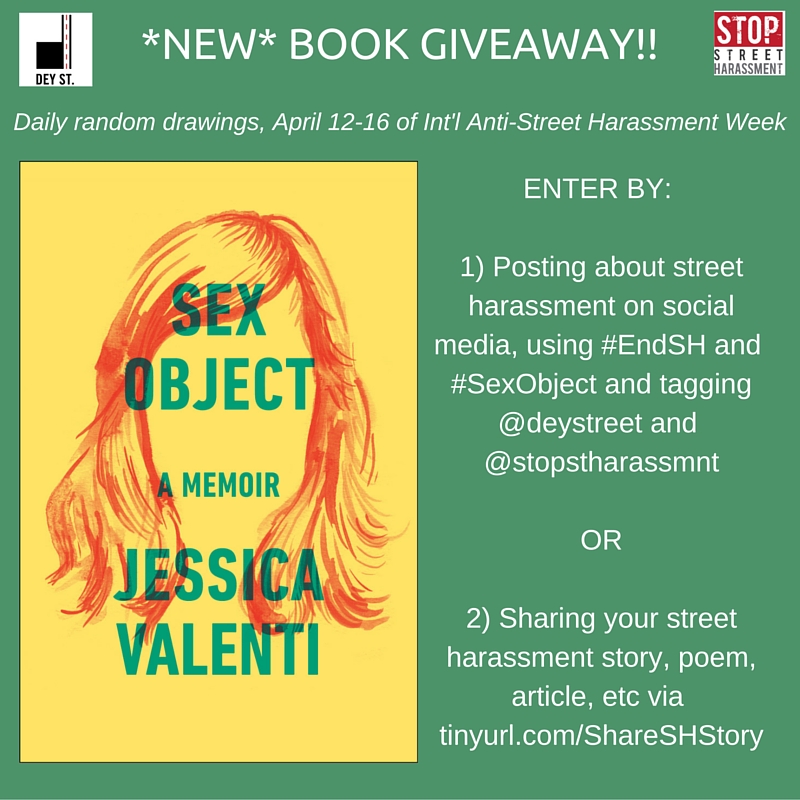“Deeply moving, honest, and unflinching, Sex Object secures Jessica Valenti’s place as one of the foremost writers and thinkers of her generation. Her personal story highlights universal truths about being a woman, and makes the case for why feminism today is an unstoppable force.” – Cecile Richards, President, Planned Parenthood Federation of America
 In honor of International Anti-Street Harassment Week, we have partnered with Dey Street Books for a giveaway of @JessicaValenti’s new memoir. I’ll do a random drawing for two copies of the book per day, from April 12-16.
In honor of International Anti-Street Harassment Week, we have partnered with Dey Street Books for a giveaway of @JessicaValenti’s new memoir. I’ll do a random drawing for two copies of the book per day, from April 12-16.
To enter the drawing:
- Post about street harassment on social media using #EndSH and #SexObject and tagging @DeyStreet and @StopStHarassmnt
OR
- Share your street harassment story, poem, article etc via tinyurl.com/ShareSHStory.
If your name is drawn, I’ll be in touch to get a mailing address from you in a few days. Note, Sex Object is on sale June 7th, so Dey Street will fulfill shipping at that time.
____________________________________________________________
I’ve been following the work of author and Feministing.com co-founder Jessica Valenti for a while. I’ve read a few of her books and I read her Guardian columns. I follow her on social media, including her new podcasts for the Guardian.
I’ve been a regular Feministing.com visitor for nearly a decade. In fact, I think Feministing was where I first learned the term street harassment via a feature about websites like Hollaback and the Street Harassment Project in 2006, and that led to me writing my master’s thesis on street harassment at GWU in 2007. I had one of the first accounts when Feministing started their community section and I’ve had the honor of guest blogging and being interviewed on the site.
I feel a lot of gratitude toward Valenti for the ways (likely unknown to her) that she has shaped my life and work.
While I’ve never met Valenti, from reading so much of her writing and seeing photos of her pup Monty and glimpses of her daughter Layla, I felt like I knew her a bit. But how much do you really know a person from their online persona?
After reading an advance copy of her forthcoming memoir Sex Object, it was clear that even when someone like her shares a lot, it’s still not everything (nor, of course, is everything in her book, either).
As the title suggests, a main theme throughout her book is how people treat her based on her body and the ways in which her body has informed some of her decisions and life paths. She writes about dealing with relentless street harassment, assault, slut-shaming in person and online, abortions, drug use, and the dangerous, life-threatening delivery of her daughter months before her due date.
To set the stage, in the opening of her book, she writes about the violence her mother and grandmother experienced by men in their lives and how “female suffering is linear” in her family. “Rape and abuse are passed down like the world’s worst birthright, largely skipping the men and marking the women with scars, night terrors, and fantastic senses of humor.”
This resonated with me as there has been a line of sexual violence, rape, incest, domestic violence, and street harassment on my maternal side of the family. I also have heard snippets about street harassment, including stalking, from my paternal grandmother and my dad’s sister. Sometimes I feel like I’m carrying the weight of not only the harassment I routinely face, but also the violations my female relatives and family members have each survived.
Valenti writes, “Worse than the violations themselves was the creeping understanding of what it meant to be female – that it’s not a matter of if something bad happens, but when and how bad.”
When every woman around you has faced violations, this rings completely true.
 She discusses her street harassment experiences, including the many men who flashed her and masturbated at her – and even on her – when she was a teenager.
She discusses her street harassment experiences, including the many men who flashed her and masturbated at her – and even on her – when she was a teenager.
She writes, “Living in a place that has given up on the expectation of your safety means walking around in a permanently dissociative state. You watch these things happen to you, you walk through them on the subway and on the streets, you see them on the television, you hear them in music; and it’s just the air you breathe, so you narrate the horror to yourself because to engage with it would be self-destructive.”
I agree. For so many of us, street harassment is an undercurrent of our life, and one that we don’t always want to acknowledge or dwell on because it’s so depressing. It’s hard to understand or realize how much street harassment – let alone all the other ways our bodies may be violated – impacts us, our psyche and our achievements and peace of mind. I am grateful to her for bringing this reality forward to clearly.
Valenti is always a compelling story-teller and she doesn’t disappoint in this book. I read it in a weekend, curious about her life, saddened to learn what she’s been through, and inspired by her resilience to keep on going, to do the work that she does that has helped shape so many women like me.
I recommend it to anyone who is a fan of her work and also to any who has gone through the tough experiences she has, as there is some comfort to be had in knowing you’re not alone.
Just as Valenti’s first book Full Frontal Feminism helped so many women identify as feminist, I hope her memoir can help women who’ve faced similar forms of abuse against their bodies know that it should not have to be “normal” or inevitable, and that together, we are strong and we can speak out and change the culture. In the same way that Valenti is working to create a better world for her daughter, so too can we all work together to ensure that life is better for the next generation.
